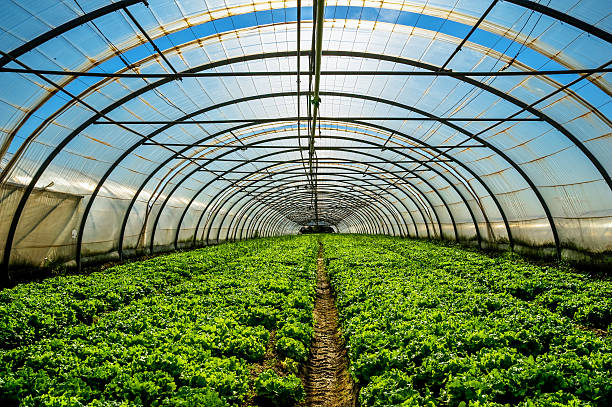Greenhouse Farming: Optimizing Crop Yields and Sustainability
Are you seeking to optimize your crop yields while promoting sustainability? Look no more than greenhouse farming. With managed atmospheres and minimized water usage, greenhouse farming uses the ideal option for year-round production of fresh fruit and vegetables. By utilizing the power of modern technology and lasting practices, you can make certain an abundant harvest while lessening your ecological influence. Discover the benefits of greenhouse farming and begin profiting today!
Benefits of Greenhouse Farming
Are you questioning what makes greenhouse farming so useful? Well, let me tell you! Among the significant benefits of greenhouse farming is the ability to manage the setting in which crops are grown. With a greenhouse, you can adjust factors like temperature, light, and humidity to enhance plant growth. This suggests that you can expand crops throughout the year, no matter of the climate condition outside.
An additional advantage of greenhouse farming is the reduction in water usage. By utilizing water a lot more successfully, greenhouse farming assists to conserve this precious source.
In addition, greenhouse farming permits much better insect and disease monitoring. With the controlled environment, it is much easier to control the spread and stop of insects and illness. This minimizes the demand for harmful pesticides, making greenhouse-grown crops much safer and more environmentally pleasant.
Additionally, greenhouse farming supplies protection versus severe climate occasions. Crops expanded in greenhouses are secured from hefty rainfall, strong winds, and hailstorms, which can damage or ruin outside crops. Monarch Greenhouse Utah. This defense makes certain an extra secure and trusted plant yield, also during unpredictable climate conditions

Making Best Use Of Plant Returns With Controlled Environments
To optimize plant yields in greenhouse farming, you can attain ideal outcomes by controlling the atmosphere. One of the vital advantages of greenhouse farming is the capability to regulate these environmental aspects, enabling you to tailor them to the details needs of each crop. By executing these regulated atmospheres, you can maximize plant yields and attain consistent, high-grade produce throughout the year.
Supporting Sustainability With Greenhouse Farming
Make the most of sustainability in greenhouse farming by implementing reliable source administration methods. One key facet of promoting sustainability is the administration of water usage. By applying systems such as drip watering and recirculation, you can substantially lower water wastefulness and make sure that every decline counts. In addition, using organic and eco-friendly materials for parasite control and fertilization can help minimize ecological effect. Integrated Pest Management (IPM) techniques, for instance, involve the usage of advantageous bugs to regulate parasites, decreasing the requirement for dangerous chemicals. In addition, power usage can be lowered by using eco-friendly energy resources, such as solar panels, to power greenhouse procedures. This not just decreases dependence on fossil gas but also decreases greenhouse gas exhausts. Correct waste monitoring is one more essential component in advertising sustainability. Applying recycling and composting systems can lower the amount of waste sent to garbage dumps while likewise giving nutrient-rich compost for plant development. Last but not least, incorporating lasting practices in greenhouse style, such as making use of energy-efficient products and optimizing natural illumination, can even more enhance sustainability. By try this web-site adopting these source management techniques, you can contribute to an extra sustainable future in greenhouse farming.
Lowering Water Use in Greenhouse Farming
By applying effective water monitoring methods, you can dramatically reduce water usage in greenhouse farming. Water is an important resource in farming, and saving it not just benefits the environment yet additionally helps to optimize crop yields and productivity. One effective technique to lower water usage is via making use of drip watering systems. These systems deliver water directly to the plant's origins, decreasing evaporation and making certain that every decrease is utilized efficiently. In addition, monitoring and regulating the moisture levels inside the greenhouse can protect against unneeded water loss. By using sensors and automated systems, you can adjust the air flow and irrigation appropriately, optimizing water usage based upon the specific demands of your plants. One more approach is to catch and recycle rainwater. Gathering rainwater from the greenhouse roofing and saving it in containers permits you to supplement your irrigation needs without relying only on freshwater resources. Moreover, executing mulching strategies can help preserve soil dampness, lowering the frequency of irrigation. Mulch work as an obstacle, stopping water evaporation and keeping the dirt cool and moist. By taking on these water-saving practices, you can minimize water waste, preserve sources, and create a much more sustainable future for greenhouse farming.
Year-Round Manufacturing of Fresh Produce in Greenhouses
Greenhouses offer a controlled atmosphere that permits you to grow crops regardless of the outside weather condition conditions. Greenhouses can be outfitted with home heating and cooling systems to maintain ideal temperature levels for different plants. By applying these strategies, you can optimize the performance of find more information your greenhouse and enjoy a consistent supply of fresh create all year long.

Verdict
In verdict, greenhouse farming gives numerous advantages for making the most of crop yields and advertising sustainability. Furthermore, greenhouse farming permits for lowered water Full Report usage, making it an environmentally pleasant selection.
One of the major benefits of greenhouse farming is the ability to regulate the environment in which crops are expanded.To take full advantage of crop yields in greenhouse farming, you can achieve optimum outcomes by controlling the atmosphere. One of the key benefits of greenhouse farming is the ability to manage these environmental variables, permitting you to tailor them to the details demands of each plant.By executing efficient water monitoring methods, you can substantially reduce water use in greenhouse farming.In conclusion, greenhouse farming offers numerous advantages for optimizing crop yields and promoting sustainability.